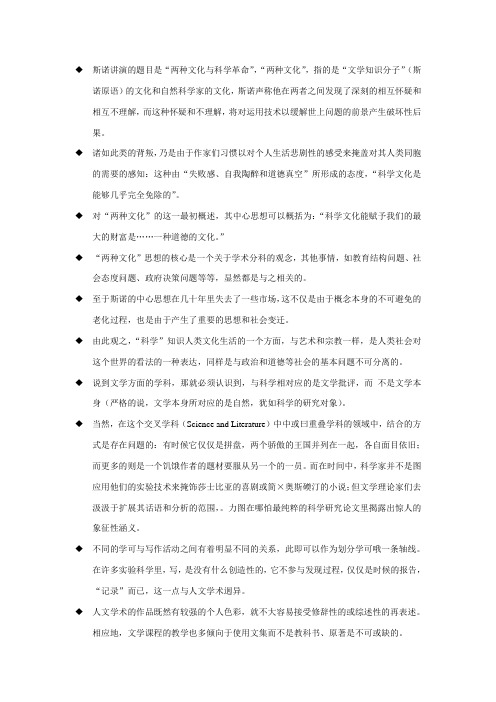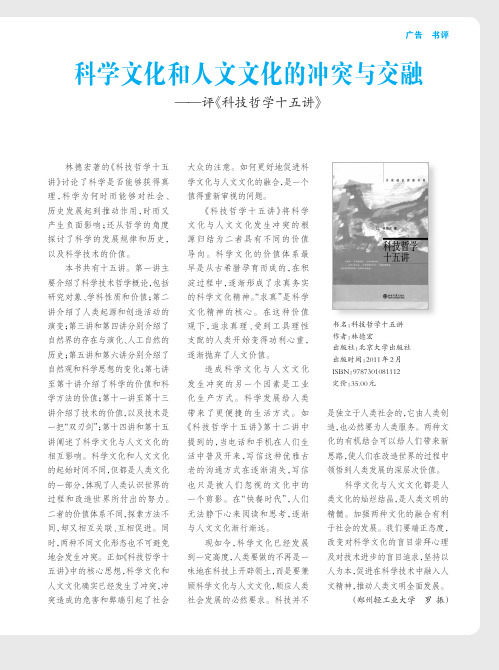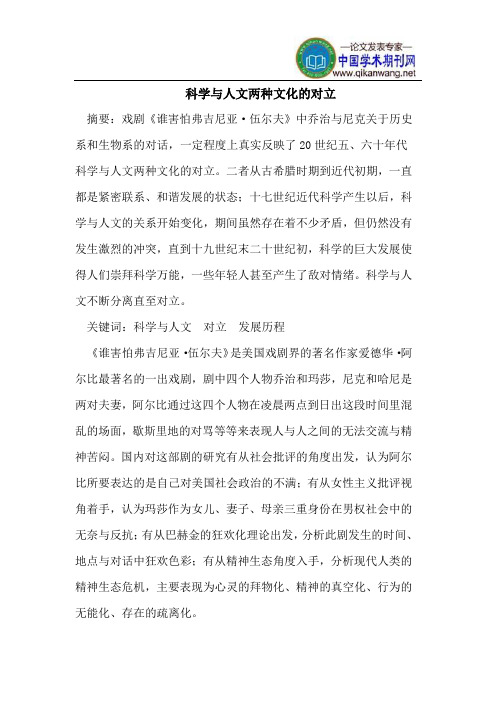讲座名称科学与文学——论两种文化之争
《两种文化》

◆斯诺讲演的题目是“两种文化与科学革命”,“两种文化”,指的是“文学知识分子”(斯诺原语)的文化和自然科学家的文化,斯诺声称他在两者之间发现了深刻的相互怀疑和相互不理解,而这种怀疑和不理解,将对运用技术以缓解世上问题的前景产生破坏性后果。
◆诸如此类的背叛,乃是由于作家们习惯以对个人生活悲剧性的感受来掩盖对其人类同胞的需要的感知:这种由“失败感、自我陶醉和道德真空”所形成的态度,“科学文化是能够几乎完全免除的”。
◆对“两种文化”的这一最初概述,其中心思想可以概括为:“科学文化能赋予我们的最大的财富是……一种道德的文化。
”◆“两种文化”思想的核心是一个关于学术分科的观念,其他事情,如教育结构问题、社会态度问题、政府决策问题等等,显然都是与之相关的。
◆至于斯诺的中心思想在几十年里失去了一些市场,这不仅是由于概念本身的不可避免的老化过程,也是由于产生了重要的思想和社会变迁。
◆由此观之,“科学”知识人类文化生活的一个方面,与艺术和宗教一样,是人类社会对这个世界的看法的一种表达,同样是与政治和道德等社会的基本问题不可分离的。
◆说到文学方面的学科,那就必须认识到,与科学相对应的是文学批评,而不是文学本身(严格的说,文学本身所对应的是自然,犹如科学的研究对象)。
◆当然,在这个交叉学科(Science and Literature)中中或曰重叠学科的领域中,结合的方式是存在问题的:有时候它仅仅是拼盘,两个骄傲的王国并列在一起,各自面目依旧;而更多的则是一个饥饿作者的题材要服从另一个的一员。
而在时间中,科学家并不是图应用他们的实验技术来掩饰莎士比亚的喜剧或简×奥斯磸汀的小说;但文学理论家们去汲汲于扩展其话语和分析的范围,。
力图在哪怕最纯粹的科学研究论文里揭露出惊人的象征性涵义。
◆不同的学可与写作活动之间有着明显不同的关系,此即可以作为划分学可哦一条轴线。
在许多实验科学里,写,是没有什么创造性的,它不参与发现过程,仅仅是时候的报告,“记录”而已,这一点与人文学术迥异。
科学文化和人文文化的冲突与交融——评《科技哲学十五讲》

广告书评林德宏著的《科技哲学十五讲》讨论了科学是否能够获得真理,科学为何时而能够对社会、历史发展起到推动作用,时而又产生负面影响;还从哲学的角度探讨了科学的发展规律和历史,以及科学技术的价值。
本书共有十五讲。
第一讲主要介绍了科学技术哲学概论,包括研究对象、学科性质和价值;第二讲介绍了人类起源和创造活动的演变;第三讲和第四讲分别介绍了自然界的存在与演化、人工自然的历史;第五讲和第六讲分别介绍了自然观和科学思想的变化;第七讲至第十讲介绍了科学的价值和科学方法的价值;第十一讲至第十三讲介绍了技术的价值,以及技术是一把“双刃剑”;第十四讲和第十五讲阐述了科学文化与人文文化的相互影响。
科学文化和人文文化的起始时间不同,但都是人类文化的一部分,体现了人类认识世界的过程和改造世界所付出的努力。
二者的价值体系不同,探索方法不同,却又相互关联、互相促进。
同时,两种不同文化形态也不可避免地会发生冲突。
正如《科技哲学十五讲》中的核心思想,科学文化和人文文化确实已经发生了冲突,冲突造成的危害和弊端引起了社会大众的注意。
如何更好地促进科学文化与人文文化的融合,是一个值得重新审视的问题。
《科技哲学十五讲》将科学文化与人文文化发生冲突的根源归结为二者具有不同的价值导向。
科学文化的价值体系最早是从古希腊孕育而成的,在积淀过程中,逐渐形成了求真务实的科学文化精神。
“求真”是科学文化精神的核心。
在这种价值观下,追求真理、受到工具理性支配的人类开始变得功利心重,逐渐抛弃了人文价值。
造成科学文化与人文文化发生冲突的另一个因素是工业化生产方式。
科学发展给人类带来了更便捷的生活方式。
如《科技哲学十五讲》第十二讲中提到的,当电话和手机在人们生活中普及开来,写信这种优雅古老的沟通方式在逐渐消失,写信也只是被人们忽视的文化中的一个剪影。
在“快餐时代”,人们无法静下心来阅读和思考,逐渐与人文文化渐行渐远。
现如今,科学文化已经发展到一定高度,人类要做的不再是一味地在科技上开辟领土,而是要兼顾科学文化与人文文化,顺应人类社会发展的必然要求。
斯诺《两种文化》

汇报人: xx年xx月xx日
目录
• 引言 • 主题概述 • 科学文化的分析 • 人文文化的分析 • 两种文化的融合与挑战 • 结论与启示
01
引言
背景介绍
20世纪50年代,英国社会和文化发生了显著变化。科技和产 业革命带来了新的发展机遇,同时也带来了一系列社会问题 。人们对文化的认知和价值观念开始出现分歧。
人文文化的成就
艺术创作
人文文化在艺术领域取得了许多杰出的成就,如文学、绘画、音乐等,为人类文明的发展 做出了重要贡献。
社会科学研究
人文文化在社会科学领域的研究和应用,为理解人类社会和文化现象提供了重要的理论和 方法支持。
文化遗产保护
人文文化对于保护和传承人类文化遗产起到了重要作用,对于维护世界文化的多样性和丰 富性具有重要意义。
THANKS
谢谢您的观看
两种文化的影响
要点一
知识领域的分离
要点二
社会结构的影响
两种文化导致知识体系之间的隔阂, 使科学与人文领域难以相互理解和交 流。
两种文化的分离反映在社会结构和教 育体系中,形成片面的知识体系和教 育模式。
要点三
文化冲突与融合
两种文化的对立和冲突同时也在不断 寻求融合与协调,试图弥合知识体系 之间的鸿沟。
科学文化与人文文化 的分裂
c.p.斯诺在书中指出,现代社会中科 学文化与人文文化之间存在明显的分 裂,导致两种文化之间的相互误解和 隔阂。
科学文化的优越性
斯诺认为,科学文化在当代社会中具 有明显的优越性,能够为人类带来实 际的利益和进步,而人文文化则逐渐 被边缘化。
人文文化的危机
斯诺指出,人文文化在现代社会中面 临着严重的危机,其影响力逐渐减弱 ,甚至被视为无关紧要的领域。
Unit 12 the two cultures

The Two CulturesC. P. Snow(查尔斯·珀西·斯诺Charles Percy Snow)作者:斯诺最值得人们注意的是他关于他“两种文化”这一概念的讲演与书籍。
这一概念在他的《两种文化与科学变革》(The Two Cultures and the Scientific Revolution,1959年出版)。
在这本书中,斯诺注意到科学与人文中联系的中断对解决世界上的问题是一个主要障碍。
斯诺特别提到如今世界上教育的质量正在逐步地降低。
比如说,很多科学家从未读过查尔斯·狄更斯的作品,同样,艺术工作者对科学也同样的不熟悉。
他写道:斯诺的演讲在发表之时引起了很多的骚动,一部分原因是他在陈述观点时不愿妥协的态度。
他被文学评论家F·R·利维斯(F. R. Leavis)强烈地抨击。
这一激烈的争辩甚至使夫兰达斯与史旺创作了一首主题是热力学第一与第二定律的喜剧歌曲,并起名为《第一与第二定律》(First and Second Law)。
斯诺写到:斯诺同时注意到了另一个分化,即富国与穷国之间的分化。
1 “It’s rather odd,” said G. H. Ha rdy, one afternoon in the early Thirties, “but when we hear about intellectuals nowadays, it doesn’t include people like me and J. J. Thomson and Rutherford.” Hardy was the first mathematician of his generation, J. J. Thomson the first physicist of his; as for Rutherford, he was one of the greatest scientists who have ever lived. Some bright young literary person (I forget the exact context) putting them outside the enclosure reserved for intellectuals seemed to Hardy the best joke for some time. It does not seem quite such a good joke now. The separation between the two cultures has been getting deeper under our eyes;there is now precious little communication between them, little but different kinds of incomprehension1 and dislike.2 The traditional culture, which is, of course, mainly literary, is behaving like a state whose power is rapidly declining—standing on its precarious2 dignity, spending far too much energy on Alexandrian intricacies, [1] occasionally letting fly in fits of aggressive pique3 quite beyond its means, [2] too much on the defensive4 to show any generous imagination to the forces, which must inevitably reshape it. Whereas the scientific culture is expansive, not restrictive, confident at the roots, the more confident after its bout5 of Oppenheimerian self-criticism, certain that history is on its side, impatient, intolerant, and creative rather than critical, good-natured and brash6. Neither culture knows the virtues of the other; often it seems they deliberately do not want to know. [3] The resentment, which the traditional culture feels for the scientific, is shaded with fear; from the other side, the resentment is not shaded so much as brimming7 with irritation. When scientists are faced with an expression of the traditional culture, it tends (to borrow Mr. William Cooper’s eloquent phrase) to make their feet ache.3 It does not need saying that [4]generalizations of this kind are bound to look silly at the edges. There are a good many scientists indistinguishable from literary persons, and vice versa. Even the stereotype generalizations about scientists are misleading without some sort of detail—e.g., the generalization that scientists as a group stand on the political Left. This is only partly true. A very high proportion of engineers is almost as conservative as doctors; of pure scientists; the same would apply to chemists. It is only among physicists and biologists that one finds the Left in strength. If one compared the whole body of scientists with their opposite numbers of the traditional culture (writers, academics, and so on), the total result might be a few per cent, more towards the Left wing, but not more than that. [5]Nevertheless, as a first approximation, the scientific culture is real enough, and so is its difference from the traditional. For anyone like myself, by education a scientist, by calling a writer, at one time moving between groups of scientists and writers in the same evening, the difference has seemed dramatic.4 The first thing, impossible to miss, is that scientists are on the up and up; they have the strength of a social force behind them. If theyare English, they share the experience common to us all—of being in a country sliding economically downhill—but in addition (and to many of them it seems psychologically more important) they belong to something more than a profession, to something more like a directing class of a new society. [6]In a sense oddly divorced from politics, they are the new men. Even the steadiest and most politically conservative of scientific veterans, [7] lurking8 in dignity in their colleges, has some kind of link with the world to come. They do not hate it as their colleagues do; part of their mind is open to it;[8]almost against their will, there is a residual glimmer of kinship there. The young English scientists may and do curse their luck; increasingly they fret9 about the rigidities of their universities, about the ossification10 of the traditional culture which, to the scientists, makes the universities cold and dead; they violently envy their Russian counterparts who have money and equipment without discernible11 limit, who have the whole field wide open. But still they stay pretty resilient12: the same social force sweeps them on. Harwell and Winscale have just as much spirit as Los Alamos and Chalk River: the neat petty bourgeois houses, the tough and clever young, the crowds of children: they are symbols, frontier towns.5 There is a touch of the frontier qualities, in fact, about the whole scientific culture. Its tone is, for example, steadily heterosexual. The difference in social manners between Harwell and Hampstead or as far as that goes between Los Alamos and Greenwich Village, would make an anthropologist blink. [9]About the whole scientific culture, there is an absence—surprising to outsiders—of the feline13 and oblique14. Sometimes it seems that scientists relish15 speaking the truth, especially when it is unpleasant. The climate of personal relations is singularly bracing16, not to say harsh: it strikes bleaklyo n those unused to it, who suddenly find that [10] the scientists’ way of deciding on action is by a full-dress argument, with no regard for sensibilities and no holds barred17. No body of people ever believed more in dialectic as the primary method of attaining sense; [11]and if you want a picture of scientists in their off-moments, it could be just one of a knock-about18 argument. Under the argument there glitter egotisms as rapacious19 as any of ours: but, unlike ours, the egotisms are driven by a common purpose.6 How much of the traditional culture gets through to them? The answer is not simple. A good many scientists, including some of the most gifted, have the tastes of literary persons, read the same things,and lead as much. Broadly, though, [12] the infiltration20 is much less . History gets across to a certain extent, in particular social history: the sheer mechanics21 of living, how men ate, built, traveled, worked, touches a good many scientific imaginations, and so they have fastened on22 such works as Trevelyan’s Social History, and Professor Gordon Childe’s books. Philosophy, the scientific culture view with indifference, especially metaphysics. As Rutherford said cheerfully to Samuel Alexander: “When you think of all the years you’ve been tal king about those things, Alexander, and what does it all add up to? Hot air, nothing but hot air.” A bit less exuberantly23, that is what contemporary scientists would say. They regard it as a major intellectual virtue, to know what not to think about. [13]They might touch their hats to24 linguistic analysis, as a relatively honorable way of wasting time; not so to existentialism25.7 The arts? The only one which is cultivated among scientists is music. It goes both wide and deep; there may possibly be a greater density of musical appreciation than in the traditional culture. In comparison, the graphic arts (except architecture) score little, and poetry not at all. [14]Some novels work their way through, but not as a rule the novels which literary persons set most value on. [15]Thetwo cultures have so few points of contact that the diffusion26 of novels shows the same sort of delay, and exhibits the same oddities, as though they were getting into translation in a foreign country. It is only fairly recently, for instance, that Graham Greene and Evelyn Waugh has become more than names. And, just as it is rather startling to find that in Italy Bruce Marshall is by a long shot the best-known British novelist, so it jolts27 one to hear scientists talking with attention of the works of Nevil Shute. In fact, there is a good reason for that: Mr. Shute was himself a high-class engineer, and a book like No Highway is packed with technical stuff that is not only accurate but often original. Incidentally, there are benefits to be gained from listening to intelligent men, [16]utterly removed from the literary scene and unconcerned as to who’s in and who’s out. One can pick up such a comment as a scientist once made, that it looked to him as though the current preoccupations28 of the New Criticism, the extreme concentration on a tiny passage, had made us curiously insensitive to the total flavor of a work, to itscumulative29 effects, to the epic qualities in literature. But, on the other side of the coin, one is just as likely to listen to three of the most massive intellects in Europe happily discussing the merits of The Wallet of Kai-Lung.8 When you meet the younger rank-and-file30 of scientists, it often seems that they do not read at all. The prestige of the traditional culture is high enough for some of them to make a gallant31 shot at it. [17]Oddly enough, the novelist whose name to them has become a token of esoteric32 literary excellence is that difficult highbrow33 Dickens. [18]They approach him in a grim and dutiful spirit as though tackling Finnegan’s Wake, and feel a sense of achievement if they manage to read a book through. But most young techniciansdo not fly so high when you ask them what they read—“As a married man,” one says, “I prefer the garden.” Another says: “I always like just to use my books as tools.” (Difficult to resist speculating what kind of tool a book would make. A sort of hammer?A crude digging instrument?)9 That, or something like it, is a measure of the incommunicabilityof the two cultures. On their side the scientists are losing a great deal. Some of that loss is inevitable: it must and would happen in any society at our technical level. [19]But in this country we make it quite unnecessarily worse by our educational patterns. On the other side, how much does the traditional culture lose by the separation?10 I am inclined to think, even more. Not only practically—we are familiar with those arguments by now—but also intellectually and morally. The intellectual loss is a little difficult to appraise34. Most scientists would claim that you couldn’t comprehend the world unless you know the structure of science, in particular of physical science. In a sense, and a perfectly genuine sense, that is true. Not to have read War and Peace and La Cousine Bette and La Chartreuse de Parme is not to be educated; but so is not to have a glimmer of the Second Law of Thermodynamics35. Yet that case ought not to be pressed too far. It is more justifiable to say that those without any scientific understanding miss a whole body of experience: they are rather like the tone deaf, from whom all musical experience is cut off and who have to get on without it. The intellectual invasions of science are, however, penetrating deeper. Psycho-analysis once looked like a deep invasion, but that was a false alarm; cybernetics may turn out to be the real thing, driving down into the problems of will and cause and motive. If so, those who do not understand the method will not understand the depths of their own cultures.11 But the greatest enrichment the scientific culture could give us is—though it does not originate like that—a moral one. Among scientists, deep-natured men know, as starkly36 as any men have known, that the individual human condition is tragic; [20]for all its triumphs and joys, the essence of it is loneliness and the end death. But what they will not admit is that, because the individual condition is tragic, therefore the social condition must be tragic, too.[21]Because a man must die, that is no excuse for his dying before his time and after a servile37 life. The impulse behind the scientists drives them to limit the area of tragedy, to take nothing as tragic that can conceivably38 lie within men’s will. [22] They have nothing but contempt for those representatives of the traditional culture who use a deep insight into man’s fate to obscure39 the truth, justto hang on to a few perks40. Dostoevski sucking up to the Chancellor Pobedonostsev, who thought the only thing wrong with slavery was that there was not enough of it; the political decadence of the avant-garde41 of 1914, with Ezra Pound finishing up broadcasting for the fascists; Claudel agreeing sanctimoniously42 with the Marshal about the virtue in others’ suffering; Faulkner giving sentimental reasons for treating Negroes as a different species. They are all symptoms of the deepest temptation of the clerks—which is to say: “[23]Because man’s condition is tragic,everyone ought to stay in their place, with mine as it happens somewhere near the top.” From that particular temptation, made up of defeat, self-indulgence, and moral vanity, the scientific culture is almost totally immune. It is that kind of moral health of the scientists, which, in the last few years, the rest of us have needed most; and of which, because the two cultures scarcely touch, we have been most deprived.。
西方马克思主义科学技术观评析

第一,科学技术是第一生产力; 第二,科学技术是推动经济和社会发展的强大杠杆; 第三,科学技术的社会作用具有两重性; 第四,科学技术(作为文化的重要组成部分)是社会文明的 基础和标志之一; 第五,科学技术是人类(摆脱愚昧,更新观念)向文明发展 的重要基础和标志之一; 第六,科学技术应该服务和造福于人,而不是控制人和奴役 人;
中国思想界的“科玄论战”
• 科学派认为:
他们从科学的泛化与实证论化前提出发,强调 科学与哲学的联系,并将哲学引向科学化。 他们认为,说科学是万能的,不是说科学的材 料和科学的结论是万能的,而是指科学的方法在 各个领域都是普遍适用的。既然科学方法是万能 的,因此,只要将科学方法应用于人生问题,科 学的人生观就是可能的。有学者曾经指出,过分 渲染的“科学主义”其实是把科学当作宗教来崇 拜。
西方马克思主义科学技术观评析
• 西方马克思主义学者对科学技术异化和 消费异化的批判
2. 西方马克思主义科技批判思想的缘起 第一:技术理性主义(即工具理性) 第一:技术理性主义(即工具理性)的出现 及其肆虐 第二: 第二:对人类生存境遇的关注及其技术理性 批判思潮的兴起 批判思潮 第三: 第三:西方马克思主义科技批判思想的登场
• 西方马克思主义学者对科学技术异化和消 费异化的批判 当代社会科学技术发展的在带来繁荣的 同时也带来的一些负效应。 西方马克思主义的科学技术观主要阐述 的就是对科学技术所表现出的异化倾向和 非人性化倾向的分析与批判。
西方马克思主义科学技术观评析
• 西方马克思主义学者对科学技术异化和消 费异化的批判
• 西方马克思主义学者对科学技术异化和消费异 化的批判
1. 西方马克思主义概述 其三,西方马克思主义产生与发展的背景: 其三,西方马克思主义产生与发展的背景: 总体而言:它是第一次世界大战后欧洲资本主义先进地区
科学功利与物欲横流——论中国人文理性传统的现代价值

承了这一思想 , 提出 “ 人为天地心” 人与天地参”的命义 。 、“
《 庄子 ・ 天地 忘乎 物,忘乎天,其名 为忘 :“
己。 忘 己之 人 ,是 之 谓 入 于 天 。 ”
孔子虽亦讲天命 、天道 ,但更看重人道 ,倡言 “ 君子之道 ,
反求诸 己” 。如 论语 ・ 宪问 > )孔子 日:“ 不怨天 ,不尤人 , 下学而上达 ,知我者其天乎?”即孔子认为 , 只有通过 自 人
谓 “ 工具理性”与 “ 价值理性”对人 同样 都拥有意义 ,但实
际上对社会支配作用更大 的是 工具理性 。 因为在某种意义上 它是与人的生存 本能相联系 , 因此它可以潜入到人的深层心 理意识发生作用 ; 而且可 以说 , 如果没有价值理性 的制约平 衡作用 , 人就会不 由自主地 完全沿着功利驱动的引导方向活 动 。 此意义上可以说 , 学的物质利欲诱惑力本极强 ,它 从 科 正在成为物欲横流泛滥的社会影响根源 。 正是科学功利意 这
心理之 内, 使人失去应该享有的人性 自由, 几乎完全使 自己 被置于科学技术的控 制之 下。如果究其根源 , 是科学技术 背
后 的工 具 理 性 在 操纵 支 配着 所有 这 一 切 。 照 韦 伯 之 说 ,所 按
学史家从理论上、 实践上证明科学与人文 同根 同源 。 也有学 者如此解释二者间相辅相成的相 互依存 关系 :“ 事实上 ,科
神奇为腐朽”的功能机 制 , 而这与资本主义使社会俗化的趋 势是一致的。 如果说科 学功利意识 吹胀 了现代 资本主义 的繁
荣气 泡的话 ,它迟 早也会 毁掉现代社会乃 至人类 的童话前
程。科学功利意识对俗众 的物欲蛊惑太过强烈 , 在人 们感 但
受到其利欲诱惑 的同时 ,已经以 自己的人性 自由付 出代价 。
自然辩证法——第九讲 科学技术与社会

(3)组织联合研究活动。
在战略发展研究乃至某些具体科学、工程、社会 问题上确立项目、联合攻关。组织经常性的学术交 流与研讨会,以加强两种文化的联系与沟通。 (4)从根本上推动两种文化教育的统一。 社会教育体系中两种文化教育的脱节是其分离 的重要原因之一。应该在幼儿园-小学-中学-大 学-硕士-博土各教育阶段,注重科学文化与人文 文化及其统一教育的适当安排,为两种文化的交融、 统一打下人才基础。
3.4 求实和效益问题
委托者与代理者间的契约张力
政治委托者:要求科学代理者提供诚实可靠的知 识并尽可能多地带来生产及经济效益。 科学代理者:看其研究结果在多大程度上体现这 种求实性和效益性。
研究活动的效益 (1)至少要推进知识的前沿。 (2)通常也要带来高等教育、军事安全、公共健康、 经济优势及其他社会绩效。
科学技术的双刃剑效应:一方面,富人类的物质生活
和精神生活;另一方面,带来了威胁人类前途的全 球性问题,背离了人类的根本利益与价值目标。
2.3 科学精神与人文精神
科学精神的核心——求真务实
科学精神的具体特征:(1)理性(逻辑)精神与实证 (经验)精神;(2)默顿的科学界的规范又称为科学 的精神气质
——12个方面的特征:(1)执著的探索精神;(2)创新、 改革精神;(3)虚心接受科学遗产的精神;(4)理性 精神;(5)求实精神;(6)求真精神;(7)实证精神; (8)严密精确的分析精神;(9)协作精神;(10)民主 精神;(11)开放精神;(12)功利精神。
1. 科技与社会各子系统的 互动机制
1.1 科技与社会各子系统的联动
科技与社会的经济、政治、军事、文化、教育等各子系 统的联系及互动作用 (1)马克思和恩格斯:科技对社会的经济、政治、文 化等因素的推动和决定作用;社会的经济、政治、文 化等因素对科技发展的决定和推动作用。
科学与人文两种文化的对立

科学与人文两种文化的对立摘要:戏剧《谁害怕弗吉尼亚·伍尔夫》中乔治与尼克关于历史系和生物系的对话,一定程度上真实反映了20世纪五、六十年代科学与人文两种文化的对立。
二者从古希腊时期到近代初期,一直都是紧密联系、和谐发展的状态;十七世纪近代科学产生以后,科学与人文的关系开始变化,期间虽然存在着不少矛盾,但仍然没有发生激烈的冲突,直到十九世纪末二十世纪初,科学的巨大发展使得人们崇拜科学万能,一些年轻人甚至产生了敌对情绪。
科学与人文不断分离直至对立。
关键词:科学与人文对立发展历程《谁害怕弗吉尼亚·伍尔夫》是美国戏剧界的著名作家爱德华·阿尔比最著名的一出戏剧,剧中四个人物乔治和玛莎,尼克和哈尼是两对夫妻,阿尔比通过这四个人物在凌晨两点到日出这段时间里混乱的场面,歇斯里地的对骂等等来表现人与人之间的无法交流与精神苦闷。
国内对这部剧的研究有从社会批评的角度出发,认为阿尔比所要表达的是自己对美国社会政治的不满;有从女性主义批评视角着手,认为玛莎作为女儿、妻子、母亲三重身份在男权社会中的无奈与反抗;有从巴赫金的狂欢化理论出发,分析此剧发生的时间、地点与对话中狂欢色彩;有从精神生态角度入手,分析现代人类的精神生态危机,主要表现为心灵的拜物化、精神的真空化、行为的无能化、存在的疏离化。
一、科学与人文文化对立的表现首先,《谁害怕弗吉尼亚·伍尔夫》发表于1962年,剧中许多细节都从侧面反映了20世纪六、七十年代科学与人文两种文化的紧张关系。
乔治,历史系博士,沉迷历史,“陷到历史里去了”;尼克,生物系毕业,生物学家。
剧中二人反复提到“历史系”“生物系”,“我是历史系的”,“我是生物系的,你才是历史系的”等等,表明这两系是冲突的、不合的,相互排斥的。
乔治问到“你们在帕尔纳索斯喝的哪种酒?”尼克一脸迷惑,问“在哪儿?”“我听不明白”。
帕尔纳索斯,是古希腊著名哲学家、诗人的居住之所,这个基本的知识,尼克根本就不明白,说明了他不关心人类历史,他更喜欢与科学打交道。
- 1、下载文档前请自行甄别文档内容的完整性,平台不提供额外的编辑、内容补充、找答案等附加服务。
- 2、"仅部分预览"的文档,不可在线预览部分如存在完整性等问题,可反馈申请退款(可完整预览的文档不适用该条件!)。
- 3、如文档侵犯您的权益,请联系客服反馈,我们会尽快为您处理(人工客服工作时间:9:00-18:30)。
讲座名称:科学与文学——论两种文化之争
主讲人:吴兰香
主讲人简介:吴兰香,女,英语语言文学博士,东南大学外国语学院教授,
硕士生导师
报告内容:说到科学与文学的关系,人们总会提及英国作家 C.P. 斯诺
(1905-1980)1959年在剑桥大学做的题为“两种文化和科学革命”的里德演讲。
事实上,在里德演讲之前,英国就曾有过关于“科学与文学”的辩论。
被称为“维多利亚时代文化使徒”的马修•阿诺德曾于1882年在剑桥做了题为“文学与科学”的里德演讲,以对抗T. H. 赫胥黎1880年在伯明翰发表的“科学与文化”演说,回击他对人文教育的指责。
在里德演讲之后的几十年里,西方文化界就科学与文学的关系展开了旷日持久的论战。
而在这几十年里,科学家和文学知识分子之间的关系似乎并没有很大的改善。
本讲座将结合当代英国小说家伊恩•麦克尤恩的作品就这个话题做进一步的探讨。
讲座时间:2018年11月28日(周三)18:30
讲座地点:九龙湖校区J1-211
教务处实践教学科
课外研学讲座活动指导中心
2018年11月24日
备注:课外研学讲座是由教务处课外研学讲座活动指导中心承办的官方科技类讲座,听报告(讲座)后,如实填写讲座现场发放的《学生聆听科技、学术报告学分认定书》并提供后续研学材料(如:评论、文献综述、读书报告或报告人要求的文字材料等),经学生所在院系“课外研学活动指导小组”认定后可获得0.2~0.4个课外研学学分。
